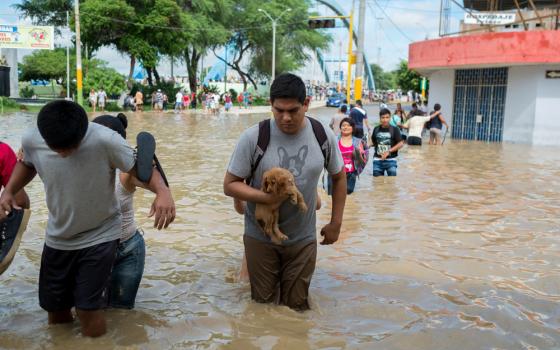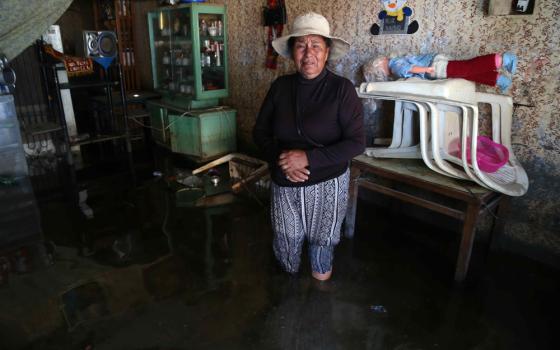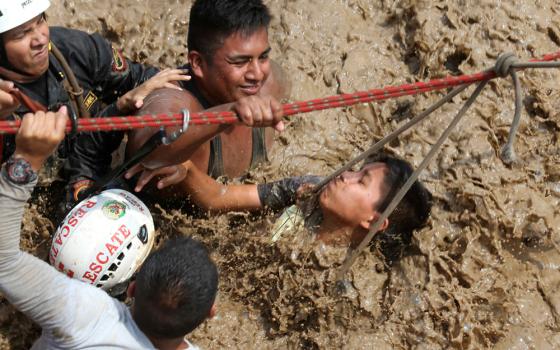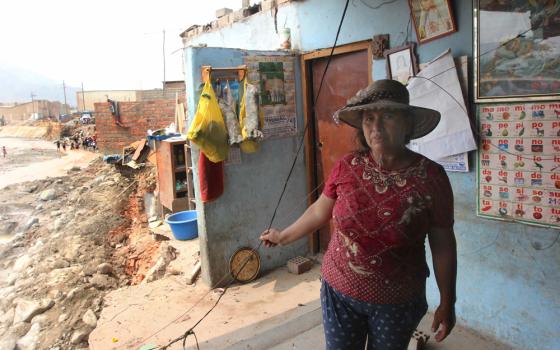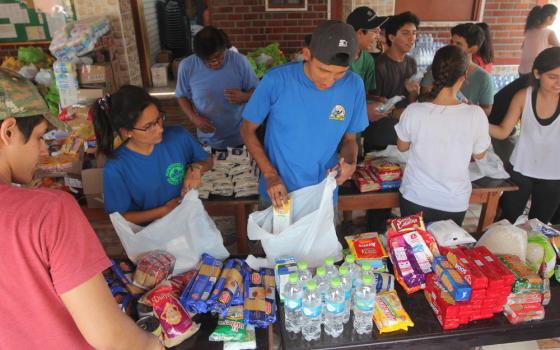Peru's most destructive flooding in two decades has destroyed more than 800 villages as the warming of Pacific waters led to torrential downpours that burst riverbanks March 15-17. The rainfall, which meteorologists have attributed to the phenomenon El Niño, is expected to continue throughout April.
Landslides and flooding have affected 24 of the country's 25 regions, and 13 regions have declared a state of emergency. And throughout those regions, where 700,000 have been left homeless, the Sisters of Bon Secours can be found trucking along in their mobile clinics.
Bon Secours Health System, a nonprofit Catholic health system founded by the Sisters of Bon Secours, flew more than 3,500 pounds of medicine into the country within two weeks of the initial flooding, said Camille Grippon, director of ecology and global ministries for Bon Secours Health System. The group, in partnership with the disaster relief agency Americares, were among the first organizations to provide an international response to the scene.
The day after the flooding began, sisters took their ambulances to the populous regions of Piura, Ancash, and La Libertad, where residents are afflicted with waterborne illnesses and homelessness. Those most affected were already economically disadvantaged, their homes constructed on cheap land along the river.
"In Trujillo [the capital of La Libertad], a lot of the places by the river are either flat and sandy or mountainous, with shantytowns, adobe houses, straw houses, or — if they're doing better—concrete houses, but this flooding took everything in its path," said Grippon, who is in charge of the international initiatives in health care delivery, emergency relief, and public health programs in developing countries, and was recently in Peru alongside the sisters.
About 40 Bon Secours Sisters from Peru are on the ground providing health care, Grippon said. While the sisters had previous experience in medical campaigns, being thrown into emergency situations requiring them to "think on their feet and troubleshoot" was a new experience for them.
"We visited communities that had 2,000 homes and now have nothing, except a makeshift shelter where people are living," Grippon said. "It's frustrating and sad to see people living by their former structures waiting for help. The only thing they have is the land. Even though they're squatters and they've taken the land illegally, the only thing they know is to stay in that piece of land. Not only did they lose the structure, but if they start walking to get health care or get provisions, they fear that their land is also going to be taken away."
Flooding washed away more than just homes: Feathers of buried livestock poke out of the earth, Grippon said. Damaged bridges, railways and highways have left towns isolated from aid, and busted sewage pipes and water treatment facilities have depressed the water supply.
Grippon said she has seen people burning garbage because of excess debris that the water pushed into piles. Puddles have become breeding grounds for flies, mosquitoes and waterborne illnesses. And with hospitals either collapsing or becoming uninhabitable because of the flood, the sisters tend to roughly 200 people a day through their makeshift 32-bed hospital, complete with emergency and operating rooms, and mobile health clinics.
While their immediate response called for treating wounds more than anything, the Bon Secours Sisters are now tending to rashes, infections and diarrhea, as well as providing clothing and food, Grippon said.
"They've answered the call for spiritual support. Families are broken, spirits are broken, and they're the rock of the community," she said. "Jesus is their rock, in terms of their ministry, but they are the rock of their community, and the communities rely on them for making sense of this."
Tending to residents' emotional needs
Mercy Sr. Blanca Quintana, who lives in the city of Chimbote in the Ancash region, has addressed the needs of families in surrounding rural regions with the help of her expertise as a psychologist: She and other sisters visit communities once a week to have conversations regarding the physical and emotional needs of flood-affected residents.
Through the country's religious conference, Quintana said various Peruvian congregations decided to accompany those who live in poverty by "helping them organize themselves and re-establish themselves and their living situations" as well as raising money among laypeople for water and nonperishables and talking with them regularly.
"People are still quite worried about their physical needs, because some have lost literally everything and are living under tents and plastics in a common area, so that's the work we're constantly tackling," she said.
"But our conversations also address what we can do for the kids and to raise their spirits. Some [Peruvian religious] sects consider this a punishment from God, and we have to tell them it's not like that," she said. Many directly blame those who did not keep up with the canal's maintenance.
The first week she and other sisters visited families in the peripheries, Quintana said many were thankful just to have survived the flooding, aware that though they lost their homes and all belongings, those were just material losses.
By the second week, however, "they started feeling those losses more deeply, because all they had to survive and maintain a living, such as their livestock, was gone, and they had no idea how they would continue.
"But now I'm starting to hear from them that, despite everything, they feel they were not abandoned."
She said this change in spirit came from realizing they could organize and unite as they rebuild their lives — a key goal of the sisters who visit those communities. And while in the first couple of weeks, communities were pessimistic that government authorities would be able to reach their remote, muddied locations, officials have visited villages where as few as 10 families reside.
They know "help is coming and they're not forgotten," Quintana said.
"It's not what they hoped for or enough for everybody, but they feel more hopeful now," she said, adding that solidarity among the people, whether afflicted or not, has been a powerful force in raising spirits.
But surrounding the capital of Lima, a village of 32 now-homeless families must return the tents the government had temporarily provided so they can be rotated to another community. Ministering in this community is Blessed Virgin Mary Sr. Miros Santillan Davila, who travels to villages surrounding the capital to provide health care to women and, now, shelter for families.
"Emergency aid has come and passed," she said.
She and her fellow sisters are building small shelters with donations from Comboni priests and lay neighbors for the families left without tents.
"It's now autumn, and we have to consider it's impossible that they'll have rebuilt homes by the time it's winter," Davila said. "We can't rebuild a shelter for all 32 families, so we'll have to figure out who needs it most. It'll be small, but at least it's a roof."
Providing local leadership
Back in La Libertad, a region with the third-largest city in Peru, Grippon said "conditions are not good," as the sun is strong enough to burn through sunblock and sunglasses are imperative to protect from conjunctivitis.
"If you look at our northern location, where we're going next, that's completely flooded — people basically living underwater. We're all geared up and have boots, repellants, this, that, but the conditions are extremely rough," Grippon said. "But sisters are committed leaders, so we're trekking out there in the muck and whatever we have to do to get care out there."
The sisters have become influential local leaders. After one mayor saw how effectively a sister ensured Bon Secours would receive water for those the flooding affected once it became available, he asked them to advocate for his city, too, Grippon said.
"It's funny how they looked at us as leaders in their state," she said.
Such leadership from the sisters contrasts the unpreparedness and lack of coordination on behalf of local officials and government, she said, noting that they're more "reactive than proactive, which is very bad when half your country is experiencing food insecurity and the potential for outbreak of illnesses.
"I hope I'm wrong, and that the president and officials have a master plan that they're not sharing with people."
But now, the Bon Secours sisters are at the table. They're invited to meetings that the governor of La Libertad has called with the Peruvian and Colombian militaries, the Argentine White Helmets and Argentine Chancellery — meetings meant to assess the crisis and coordinate organized responses.
The sisters and Grippon, she said, were the only women and the only nongovernmental, nonmilitary players in attendance. And they were the only ones who talked about health, as others focused on rescue and water, Grippon said.
Though the agencies and sisters are addressing immediate needs, long-term hurt awaits the country. According to the Los Angeles Times, "the cost to Peru's economy in lost productivity has been estimated at $3.1 billion, or 1.6 percent of the country's annual output of goods and services." At least another $3.75 million will go toward repairing bridges and roads, the Associated Press reported.
Though it's been more than a month since the Bon Secours sisters began providing aid to locals, traveling community to community every day, their work has barely begun.
"They'll be doing this for another year, at best," Grippon said.
Quintana, too, expects flood recovery to be at least a yearlong accompaniment.
"The children were so scared, and we have to help their parents energize and encourage them, so we'll continue visiting them every week to see how they're feeling and see what projects we can do for them. It's not just up to the authorities — it's all our responsibilities. We have to take matters into our hands and be bridges of support."
[Soli Salgado is a staff writer for Global Sisters Report. Her email address is [email protected]. Follow her on Twitter: @soli_salgado.]
